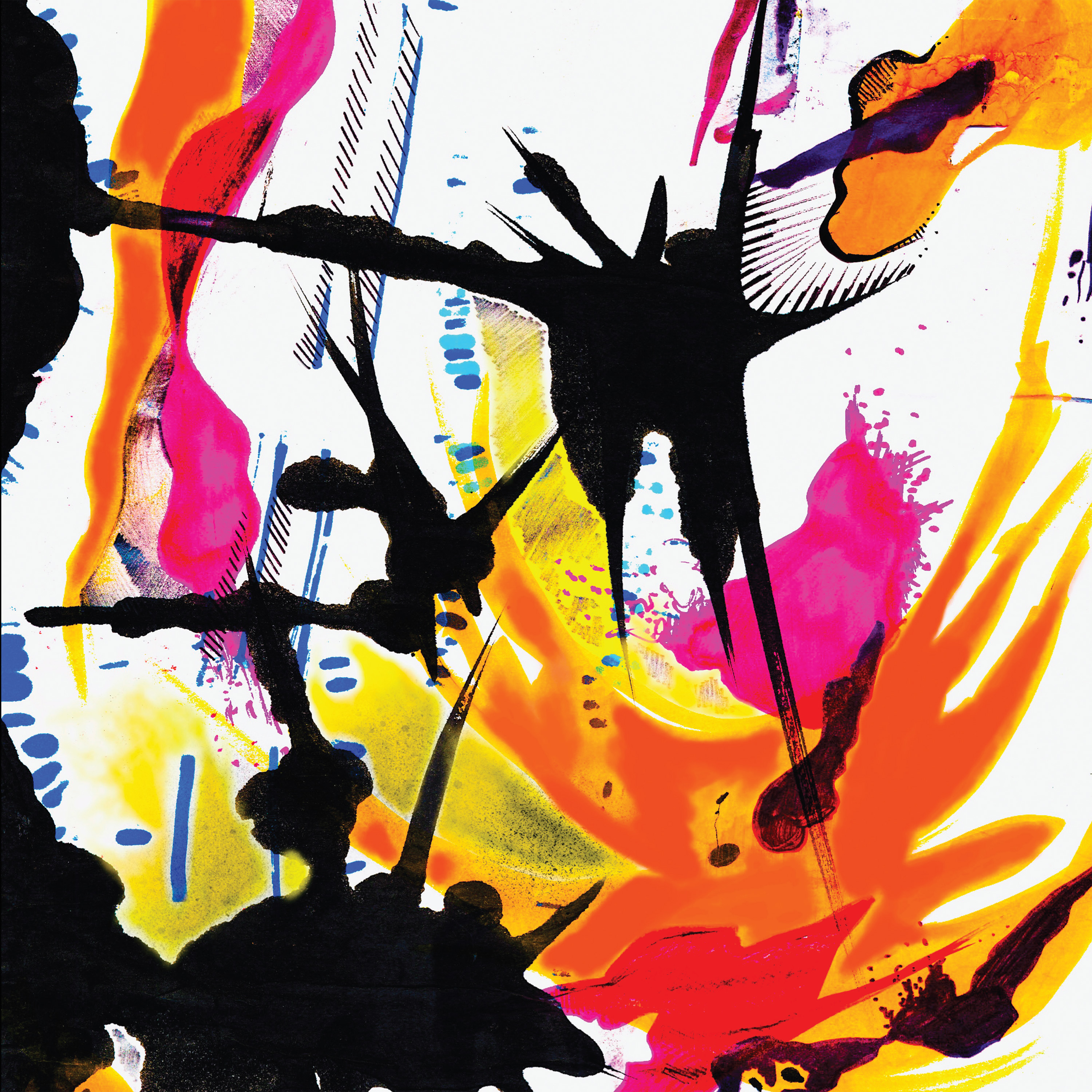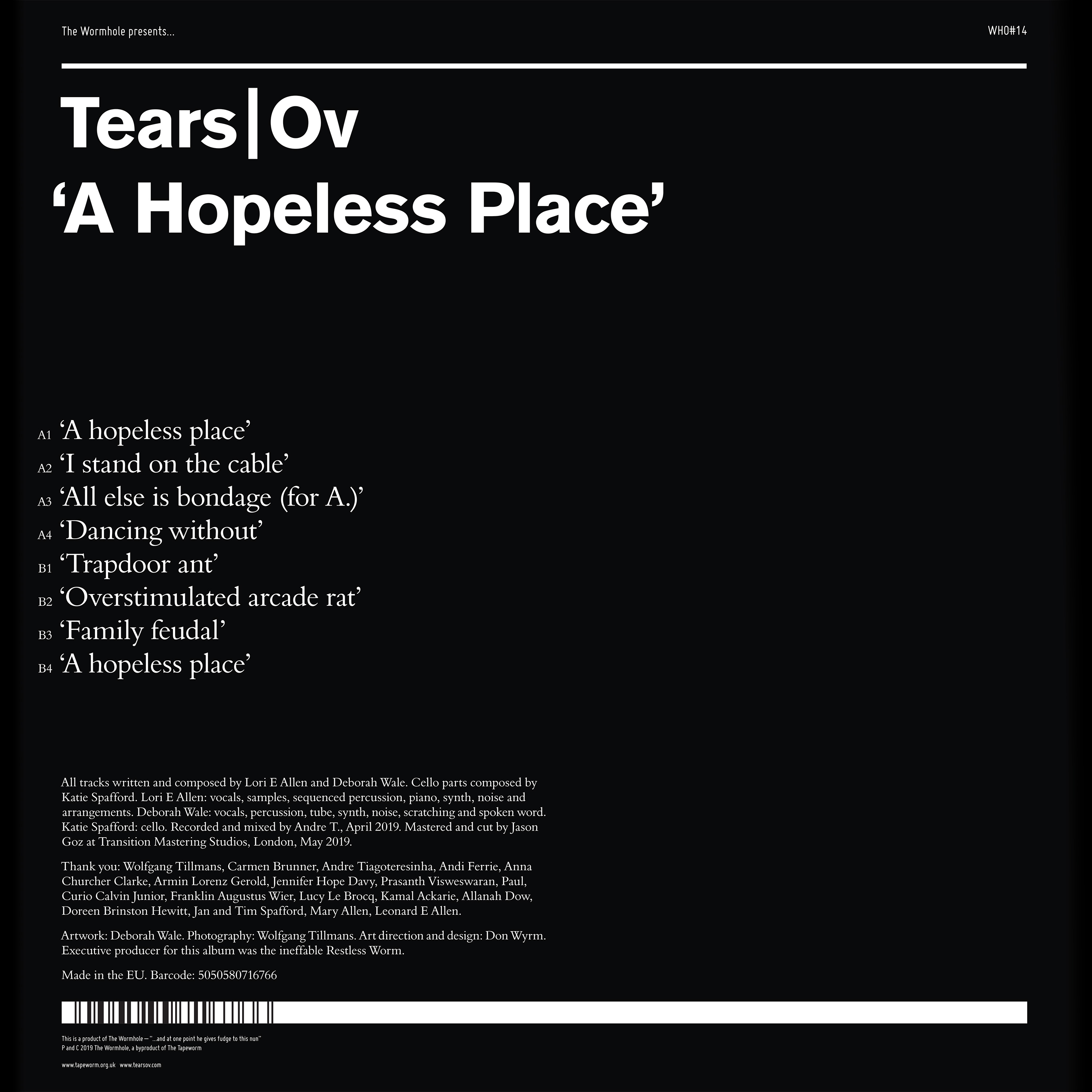WHO#14 – Tears|Ov – A Hopeless Place
Gatefold LP (edition of 200) / DL
Buy on Bandcamp
Mastered and cut by Jason Goz at Transition Mastering Studios, London, May 2019. Artwork: Deborah Wale. Photography: Wolfgang Tillmans.
A1: A Hopeless Place
A2: I Stand On The Cable
A3: All Else Is Bondage (For A.)
A4: Dancing Without
B1: Trapdoor Ant
B2: Overstimulated Arcade Rat
B3: Family Feudal
B4: A Hopeless Place
Its title track is now available to stream or download from the usual suspects
Founded in 2015, Tears|Ov are sound artist/self-taught musician Lori E Allen, classically trained cellist/mixed media artist Katie Spafford and illustrator/prison psychotherapist Deborah Wale. The trio first collaborated on Lori E Allen’s ‘Tears of the Material Vulture’ cassette on The Tapeworm, a re-imagination of a brief collaboration with Madame Chaos of cut-up cablecasts, 1995-1996, on Manhattan Neighborhood Network and Television in New York City. That release served to resurrect a hibernating creative practice between the three friends.
Their writing process takes the form of structured improvisation. Allen will create a bed of loops, field recordings or a full framework. She then shares this base with Wale and Spafford who embellish or delete, the three building the pieces through long improvised sessions in London, playing late into the night. During these sessions, the feeling of a songs’ words or the emotional tone of a sound can spark sudden mood changes, altering the arc of the compositions. ‘Crucially the music is improvised – it is never the same twice. There are triggers and moments that signal moving to another part of the music, but the timings and lengths largely depend on our moods and interpretation on a given day/performance. Because of this, the album was recorded with ambient mics capturing multiple instruments. It wasn’t possible to record all the instruments separately as we respond to each others improvisation. Even if the changes are very minor, they really affect the emotion of each piece’ Spafford says.
‘A Hopeless Place’ was initiated by a commission from Wolfgang Tillmans to perform at the Tate Modern’s South Tanks, part of a concert series curated by the artist in parallel to his 2017 retrospective at the gallery. ‘We were asked to play a gig at the Tate in March 2017’ recalls Lori. ‘I’d already started on some of the tracks, but it gave us an opportunity to present them as a composition around their connected themes. Sometime after the gig we decided to capture the work and turn it in to an album.’
For Lori, the album is about loss, ‘especially grief around the edges of growing out of something in order to move toward something else. It’s about transformation through love, not knowing how to hold on to everything while wanting desperately to let go of all of it, craving new shapes but feeling warped in the process of shapeshifting. It’s also about how love changes you, if you allow it to. It can’t be apportioned. And this is the biggest mistake of all – which we all joke about in vain grasping for control over the pleasure of losing control – that’s what the gameshow track represents – the compulsion to break taboo.’
Tears|Ov’s debut is presented as a continuous journey, devised to be heard as a whole. ‘Though I’m interested in attaining a peaceful hold on mixing emotions on a personal level, the compositions seem to come out all sideways, morose and capricious,’ Lori says. ‘I like to change the mood slowly and sometimes suddenly – like how it happens in your heart.’
Debbie notes how the albums’ different movements work for or against each other. ‘“Dancing Without” is about finding a book about nothingness, just lying there on the street, and having gratitude for nothing being nothing yet still somehow falling out of the sky as an object – not just a concept. For “Overstimulated Arcade Rat”, the inspiration was about the feeling of being on a new psychotic substance, endlessly playing video games – a metaphor for being forced into addiction by society, for getting lost in the pressure of finding your way. “Trapdoor Ant” is about the protective survival mechanism of the trapdoor ant. They have the fastest moving predatory appendages within the animal kingdom, used as a catapult to eject intruders or ping themselves backwards to escape threat. The peak force is 300 times the body weight of the ant…’
In Katie’s opinion the album represents an emotional journey, ‘often one started by Lori and shaped by the band. Through my cello melodies, I seek to create a story throughout the album, like a voice. The way the tracks are stitched together is akin to how a symphony is structured, with its different movements; each one with its own story, building to a greater whole. The emotions that Lori describes – of loss, grief and love – are echoed in the romantic and often heart-rending cello melodies. As I am not the one who creates the initial concepts or ideas, for me it’s much more about how I absorb and feel the raw emotion of each track, then voicing and interpreting what I feel through the cello.’
Reviews
The Wire (UK):
The Tears|Ov trio explores loss, grief and love through the structured improvisation of sound artist and media archaeologist Lori E Allen and illustrator and prison psychotherapist Deborah Wale, along with cellist Katie Spafford. Initially a Tate commission for Wolfgang Tillmans’s 2017 retrospective A Hopeless Place is developed from Allen’s initial loops, field recordings and framework, which would then be deconstructed by the others’ percussive, spoken word, sonic and musical contributions. These would ultimately become what Wale describes as its own sort of symphony, with a number of movements comprising a greater whole. Allen’s signature broadcast excavations are cut up and reassembled along distorted synth lines on “I Stand On The Cable”. A morose, screaming, squealing interlude on the hysterical “Dancing Without” echoes the eerie no wave and post-industrial collaboration of the likes of Einstürzende Neubauten and Lydia Lunch.
Groove (DE):
Der neoklassisch anmutende Outsider-Pop der Londoner Tears|Ov ist nicht weniger interessant und genialistisch. A Hopeless Place (The Wormhole/The Tapeworm, VÖ 1. November) das als Auftragsarbeit zu/für/mit eine(r) Ausstellung des Fotografen Wolfgang Tillmanns entstand, zieht immense innere Spannung aus der Konfrontation und Amalgamierung extrem unterschiedlicher musikalischer Erfahrungen und Arbeitsweisen, die bei den drei Musikerinnen von einer klassischer Ausbildung am Cello zum Einfach-mal-laufenlassen selbstgebastelter, elektronischer Noise-Gadgets reicht. Die Stücke sind demnach gerichtete Improvisationen mit einer gehörigen Portion Zufall. Was sie spannend und passagenweise richtig genial macht, ist die Interaktion der Musikerinnen, die der Zufälligkeit entgegenarbeiten.
The Vinyl District (US):
Consisting of sound artist/ self-taught musician Lori E Allen, the classically trained cellist/ mixed media artist Katie Spafford and illustrator/ prison psychotherapist Deborah Wale, this album, sparked by a commission by the German photographer Wolfgang Tillmans as part of a curated concert series to run alongside his 2017 retro at the Tate Modern Gallery, combines assorted synths and programmed drums with Allen’s piano, Wale’s percussion and Spafford’s cello to build through structured improvisation a powerful blend of electronic and organic elements that makes its deepest impression through the use of samples, voices, and spoken words, often looped, including a dive into different eras of Family Feud and some of the best cyclical laughter I’ve heard in a while. A-
Cyclic Defrost (Australia):
Tears|Ov are an experimental trio founded in 2015 comprised of sound artist Lori Allen, classically trained cellist Katie Spafford and illustrator / prison psychotherapist Deborah Wale. On the heels of their initial collaboration on Allen’s 2016 solo album ‘Tears Of The Material Vulture’, this debut album from the trio ‘A Hopeless Place’ offers up eight tracks that see them crafting a curious blend of live instrumentation, synthetic elements and unpredictable samples that often defies easy categorisation.
Title track ‘A Hopeless Places’ opens this album on a distinctly cinematic note as slow drums beat against a backdrop of digitally treated instrumentation and glitchy flutters, only for elegant piano arrangements to slowly unfurl against slow bass cello plucks and weirdly pitchshifted vocal samples. While it sounds slightly unwieldy in printed form, in practice it’s curiously coherent and lulling.
By contrast, ‘I Stand On The Cable’ devolves a sampled wartime speech down into a bizarre bed of layered chuckles against coldly severe minimal wave synths and vaguely acidic squelches that sits closer to one of Negativland’s sound cut-ups, with its surrealist blend of alternately sinister and absurd elements.
‘All Else Is Bondage (For A.)’ meanwhile sees Allen’s vocals rising up like a ghost against a restlessly swirling backdrop of cello loops, bass drones and sparse electronic chirps, the almost ritualistic atmosphere that’s generated calling to mind a more ethereal take on Diamanda Galas.
Elsewhere, ‘Trapdoor Ant’ offers a jagged wander through refracted sounding treated instrumentation, strangely jazzy jangling bass chords and Allen’s imperious sounding vocals, before ‘Family Feudal’ mashes samples of gameshow questions into a furious burst of noise, mournful cello drones and looped audience applause. While ‘A Hopeless Place’ is often a bizarre listening experience, there’s a consistent sense of compelling logic at work here.
Beach Sloth:
Tears|Ov explores the stuff of dreams and nightmares on the impossibly dense “A Hopeless Place”. Featuring a cut-up technique applied to loops that would make any Beat Poet proud, the whole of the album feels akin to applying grandeur to the gritty. Emotion ties the whole thing together for it ends up being quite moving really. Intersection of classical alongside the found sound samples means they carry quite a bit of weight to them. At times Tears|Ov recalls a little bit of the true No Wave oddball Boris Policeband, including their inclusion of cello into the mix to give it a bit of texture and beauty. Vocals too further add to this spirit of the fragility of the whole.
Setting the tone for what follows is the gorgeous tribal aesthetic of the title track and opener “A Hopeless Place”. Cello work has a nimble quality on “I Stand On The Cable” The lo-fi laughter of “Dancing Without” goes for something truly and deeply creepy. Allowing the sample to continue to loop further adds to its inherent cryptic quality. Flexible grooves that bend like elastic intermingle on “Trapdoor Ant”. Gentler in tone “Overstimulated Arcade Rat” offers almost a melodic anchor of sorts. Glitch effects work wonders on the album highlight, the utterly hypnotic “Family Freud”. Ending things off on a meditative note is yet the title track reconfigured.
A truly confounding yet compassionate piece of sonic poetry in multiple ways, Tears|Ov embraces a collage approach to stunning effect on “A Hopeless Place”.
Toneshift:
[…] The songs are characterized by happening in different phases and contrast is definitely one of the main methods for this to be realized. Cut ups alternate between different photographs, depictions of chronologically non-subsequent moments. But all these alternations happen without stressing the contrasting element in the contrapositions and every new figure holds a perfect coherence with the previous one. The role of stitching up all these moments together, as snaps from the same late-night party, is interpreted by the cello. By opening up for different sets of emotions and harmonic changes, it mitigates the dualistic tendency of the collages and joins all the tracks of the album into a single, unpredictable but familiar thread.
I was very pleasantly surprised by this record, that I didn’t expect it touching me so deeply. Despite some sonic elements that might draw too many signifiers from existing musical aesthetics such as industrial and dark wave, the trio is very able to make all suggestion collapse with sprinkles of pure genius and to open up for reflections about crossover genres and music identity. [Read the full review here…]



